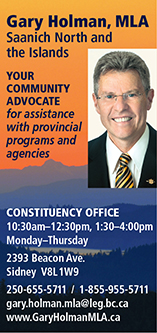Archive for January 2016
Municipalities & Province Moving Ahead Together
by Roger Stonebanks, citizen reporter
Optimism radiated following a meeting between Community Minister Peter Fassbender and Capital Region mayors on issues of governance.
“We have all agreed – all of the mayors and myself – that we had a very productive meeting,” Fassbender told Saanich Voice Online. “There’s measureable value in sitting together to discuss issues of common interest and concern.
“Our goal coming out of the meeting was to look for ways to move forward. The Province has committed to providing a facilitation process to specifically identify what the real issues are that are being faced by all of the communities. Following that outcome, we have committed to meet again.
“We will ensure that the public is kept informed of the work we undertake.”
In inviting the mayors to the meeting on Dec. 3, 2015, Fassbender said “ . . . there may be benefit to the region from local governments exploring further the question of how to better integrate services and governance.”
Sidney Mayor Steve Price told SVO, “We had a very productive meeting with Minister Fassbender. All of the region’s mayors were in attendance and each one raised individual ideas and thoughts on what was working well in their individual municipalities and also what services were already integrated, how that was working and are there potentially any other efficiencies we could be looking at region-wide.
“The minister and his staff took detailed notes and will come back to us at some point in the new year to arrange another meeting to further discuss some of the points that were raised.”
Mayor Alice Finall of North Saanich also told SVO, “ … it was a productive meeting. The Minister was very clear that the province would not force amalgamation of the Regional municipalities. He did suggest a future meeting of the mayors to consider possible further efficiencies in delivery of services and also to be sure that everyone had the same information. No date is yet set for such a future meeting nor the format.”
Mayors Richard Atwell of Saanich and Ryan Windsor of Central Saanich did not respond with comments by the SVO’s press time.
Meanwhile, the 13-member residents committee that will examine Saanich governance is expected to be named and start work in January on a minimum 18-month project. Council has implemented the non-binding (expression of opinion) referendum on Nov. 15, 2014, when voters answered “Yes” to this question: “Do you support Council initiating a community-based review of the governance structure and policies within Saanich and our partnerships within the Region?”
You’ll find more on this subject by using the SVO search feature: amalgamation and/or governance
ga('create', '__', 'auto'); ga('send', 'pageview');

Affordable Housing Proposed
For Cordova Bay Plaza Development
by Roger Stonebanks, Re-printed by permission from the Cordova Bay Association for Community Affairs Newsletter.
When the time comes for new plans for redevelopment of Cordova Bay Plaza – a local community activist group hopes that affordable housing is part of the plaza’s future.
Spokeswoman Hanny Pannekoek said her group, working under the Saanich South NDP Executive and in support of MLA Lana Popham, has chosen to focus on affordable housing and building community as its current topic.
“We decided to connect the promotion of affordable housing with a future plan for the Cordova Bay Plaza,” she said.
“We envision a plaza which includes affordable housing, a plaza with a mixture of shops, homes and green space, making the plaza a place where people can live, shop and gather in community.” Pannekoek said the group wishes to work with others in a non-partisan way.
Plans for a mixed commercial-residential redevelopment of the plaza, which was built in 1960, were approved by Saanich council in 1999. They included a supermarket three times the size of the present one plus shops with 16 apartments above them and a specific bank building.
But underground gasoline pollution spreading from an off-site closed service station resulted in Saanich not issuing the Development Permit. Remediation was undertaken and a Certificate of Compliance issued in 2012 by the
Environment Ministry. Redevelopment, however, did not occur. Most leases including Tru-Value Foods run to 2017.
Plaza spokeswoman Brenda Ferguson of Sutton Realty told The Cordovan a review of the future of the property including whether to sell or redevelop will happen by the spring of 2016. “Nothing is planned at this time,” she said. If the decision is to sell, the buyer would need at least a year’s lead time or longer.
She said it has proven difficult to lease vacant space (there are two vacancies) with only the offer of a short-term lease. Five-year leases now would take the plaza to 2020. Recently, the plaza faced the expense of a new roof that “had to be replaced.”
Pannekoek, a former secretary of the Cordova Bay Association for Community Affairs (CBA), said the CBA has offered to work with her group in holding an ‘open house’ to discuss the idea of affordable housing with the wider community and solicit further ideas and input.
Anyone interested in this matter and/or would like to work with the group is invited to contact Hanny at [email protected]
ga('create', '__', 'auto'); ga('send', 'pageview');

Serious Gag Reflex
A Look at the Use of SLAPP Suits to Silence the Citizenry
by Ed Johnson, citizen reporter
“A strategic lawsuit against public participation (SLAPP) is a lawsuit that is intended to censor, intimidate, and silence critics…”, according to Wikipedia.
Opposition justice critic Leonard Krog, further defines it as “…often a baseless lawsuit which targets organizations and individuals purely to force them to waste resources and time to defend themselves from these baseless attacks and thus constrain their continued
active public participation.
“These lawsuits also act as further intimidation of other citizens who might be wanting to also demonstrate their concerns on issues such as the protection of agriculture land, water quality and broader environmental issues.”
It is a scenario that has been played out in several municipalities in the region where the resulting urban sprawl has become a hot topic. Citizens who align themselves against
unwanted development projects have to determine if the financial and legal challenges they may face are worth the personal sacrifice necessary to achieve their goal.
It is common for the playing field to be uneven. Developers may have access to significant resources as well as the ablity to underwrite the costs of a suit as a business expense. It then becomes a game of whose resources outlast the others.
In one case in Vancouver a citizens group was successful in its bid to stop development of a nearby forest. They were even awarded costs for their attorney.
The BC Supreme Court judge had this to say about the case (Scory V. Krannitz, May 2011):
“…there is no evidence that the statements made by [the defendants] concerning the possible negative consequences of the proposed fill deposit were represented as absolute certainties. It is apparent that the respondents’ statements were opinions about what could happen. These opinions are on a matter of public interest, were recognizable as comment by any objective standard, and not actuated by malice. Thus the defence of fair comment is also available to the respondents even if the statements are proven to be false.”
While the citizen group was finally victorious in their battle to save the forestland, they still lost. Their lives were so changed by the three-year-long battle that many say that they no longer join citizen groups or speak out publicly on any issue for fear of the great costs of litigation.
While things are moving forward on this front in Ontario with their passing of their Protection of Public Participation Act, BC has in fact gone backwards. In 2001 BC, under the NDP government, did pass a similar bill to Ontario’s. Weeks later The BCNDP were defeated in a provincial election and the BC Liberals immediately axed the SLAPP legislation. Despite repeated requests to reinstate the legislation that would give BC judges greater powers to evaluate the merits-or lack thereof-of these types of lawsuits, the BC Liberals have so far refused to do so.
Protective legislation would greatly please Alan Dutton, one of five Kinder Morgan defendants who were threatened with a multi-million dollar lawsuit last year for opposing the 5.4 billion dollar Trans Mountain pipeline expansion. While Kinder Morgan ‘discontinued’ the action, this merely meant that it could be resumed at a later time.
Closer to home, there are several pending legal actions that may qualify for the ‘SLAPP’ moniker. Perhaps if the anti-SLAPP legislation had been in place these may have never come about, or at least would have been speedily resolved – if a judge deemed them to be strategic lawsuits with the goal of thwarting public participation.
Whether there is an active SLAPP suit going on or not, one should consider what effect the very threat of these malicious acts has on our community’s ability and willingness to voice opinion and engage. The threat is real, as long as the Province refuses to protect our democracy through legislation.
SLAPP Protection Legislation may be discussed during the next legislative session, or not, depending on the whim of the majority government or an outpouring of support from the
citizenry.











